I am having difficulty understanding the role of io_service when it comes to TCP/IP sockets. Here is my basic understanding of io_service. The io_service->run() blocks and accepts work requests (We use the io_service::work) to post or dispatch work to the io_service. Am I correct here? Please let me know if I am missing anything? Now following is my code for a simple server
void RunServer()
{
boost::shared_ptr< boost::asio::io_service > io_service(new boost::asio::io_service);
boost::shared_ptr< boost::asio::ip::tcp::acceptor > acceptor(new boost::asio::ip::tcp::acceptor( *io_service ));
boost::shared_ptr< boost::asio::ip::tcp::socket > sock( new boost::asio::ip::tcp::socket( *io_service ) );
try
{
boost::asio::ip::tcp::resolver resolver( *io_service );
boost::asio::ip::tcp::resolver::query query( "127.0.0.1", boost::lexical_cast< std::string >( 7777 ));
boost::asio::ip::tcp::endpoint endpoint = *resolver.resolve( query );
acceptor->open( endpoint.protocol() );
acceptor->set_option( boost::asio::ip::tcp::acceptor::reuse_address( false ) );
acceptor->bind( endpoint );
acceptor->listen( boost::asio::socket_base::max_connections );
acceptor->async_accept( *sock, boost::bind( OnAccept, _1, sock ) );//Receives only one connection
std::cout << "Waiting for incoming connections \n";
io_service->run(); //Confusion here --- Line A
}
catch( std::exception & ex )
{
std::cout << "[" << boost::this_thread::get_id()<< "] Exception: " << ex.what() << std::endl;
}
}
Now I know that incase there is no work object attached to io_service the method io_service->run() will never block, correct? Now my question here is what role does io_service->run() play above. From experimentation I realized that if I remove the code the OnAccept method is not called. Also where is the work being added to the io_service here. What exactly is happening here? Any explanation that clarifies this would be appreciated.
